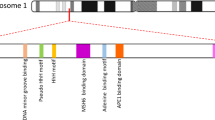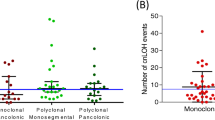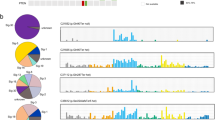Abstract
Hereditary non-polyposis colorectal cancer (HNPCC) is caused by germline mutations in mismatch repair (MMR) genes, mostly MLH1 and MSH2. Somatic inactivation of the wild-type allele of the respective MMR gene is required for tumor development. Unexpectedly, a recent study utilizing DNA from paraffin-embedded tissue material detected frequent loss of the mutant MMR gene allele in HNPCC tumors. Dual role for loss of heterozygosity (LOH) was proposed. If somatic loss of the wild-type MMR gene allele had occurred through point mutation or promoter hypermethylation, frequent somatic deletions at the region of the MMR gene locus, perhaps targeting other relevant cancer genes, could quite commonly lead to loss of the mutant allele. To test this hypothesis, we studied a population-based series of 25 fresh-frozen HNPCC tumors with a germline mutation in MLH1 or MSH2 for LOH. Fourteen of the 25 tumors (56%) showed LOH at the respective locus, and all 14 losses targeted the wild-type allele (P=0.00006). These results strongly support the traditional two-hit model of HNPCC gene inactivation.
This is a preview of subscription content, access via your institution
Access options
Subscribe to this journal
Receive 50 print issues and online access
$259.00 per year
only $5.18 per issue
Buy this article
- Purchase on Springer Link
- Instant access to full article PDF
Prices may be subject to local taxes which are calculated during checkout


Similar content being viewed by others
References
Aaltonen LA, Peltomäki P, Leach FS, Sistonen P, Pylkkänen L, Mecklin JP et al. (1993). Clues to the pathogenesis of familial colorectal cancer. Science 260: 812–816.
Aaltonen LA, Salovaara R, Kristo P, Canzian F, Hemminki A, Peltomäki P et al. (1998). Incidence of hereditary nonpolyposis colorectal cancer and the feasibility of molecular screening for the disease. N Engl J Med 338: 1481–1487.
Ben-Ezra J, Johnson DA, Rossi J, Cook N, Wu A . (1991). Effect of fixation on the amplification of nucleic acids from paraffin-embedded material by the polymerase chain reaction. J Histochem Cytochem 39: 351–354.
Canzian F, Salovaara R, Hemminki A, Kristo P, Chadwick RB, Aaltonen LA et al. (1996). Semiautomated assessment of loss of heterozygosity and replication error in tumors. Cancer Res 56: 3331–3337.
Chadwick RB, Pyatt RE, Niemann TH, Richards SK, Johnson CK, Stevens MW et al. (2001). Hereditary and somatic DNA mismatch repair gene mutations in sporadic endometrial carcinoma. J Med Genet 38: 461–466.
Cunningham JM, Christensen ER, Tester DJ, Kim CY, Roche PC, Burgart LJ et al. (1998). Hypermethylation of the hMLH1 promoter in colon cancer with microsatellite instability. Cancer Res 58: 3455–3460.
Cunningham JM, Kim CY, Christensen ER, Tester DJ, Parc Y, Burgart LJ et al. (2001). The frequency of hereditary defective mismatch repair in a prospective series of unselected colorectal carcinomas. Am J Hum Genet 69: 780–790.
Hemminki A, Peltomäki P, Mecklin JP, Järvinen H, Salovaara R, Nyström-Lahti M et al. (1994). Loss of the wild type MLH1 gene is a feature of hereditary nonpolyposis colorectal cancer. Nat Genet 8: 405–410.
Herman JG, Umar A, Polyak K, Graff JR, Ahuja N, Issa JPJ et al. (1998). Incidence and functional consequences of hMLH1 promoter hypermethylation in colorectal carcinoma. Proc Natl Acad Sci USA 95: 6870–6875.
Ionov Y, Peinado MA, Malkhosyan S, Shibata D, Perucho M . (1993). Ubiquitous somatic mutations in simple repeated sequences reveal a new mechanism for colonic carcinogenesis. Nature 363: 558–561.
Kane MF, Loda M, Gaida GM, Lipman J, Mishra R, Goldman H et al. (1997). Methylation of the hMLH1 promoter correlates with lack of expression of hMLH1 in sporadic colon tumors and mismatch repair-defective human tumor cell lines. Cancer Res 57: 808–811.
Konishi M, Kikuchi-Yanoshita R, Tanaka K, Muraoka M, Onda A, Okumura Y et al. (1996). Molecular nature of colon tumors in hereditary nonpolyposis colon cancer, familial polyposis, and sporadic colon cancer. Gastroenterology 111: 307–317.
Kuismanen SA, Holmberg MT, Salovaara R, de la Chapelle A, Peltomäki P . (2000). Genetic and epigenetic modification of MLH1 accounts for a major share of microsatellite-unstable colorectal cancers. Am J Pathol 156: 1773–1779.
Lamlum H, Ilyas M, Rowan A, Clark S, Johnson V, Bell J et al. (1999). The type of somatic mutation at APC in familial adenomatous polyposis is determined by the site of the germline mutation: a new facet to Knudson's ‘two-hit’ hypothesis. Nat Med 5: 1071–1075.
Leach FS, Nicolaides NC, Papadopoulos N, Liu B, Jen J, Parsons R et al. (1993). Mutations of a mutS homolog in hereditary nonpolyposis colorectal cancer. Cell 75: 1215–1225.
Lu SL, Akiyama Y, Nagasaki H, Nomizu T, Ikeda E, Baba S et al. (1996). Loss of somatic mutations of hMSH2 occur in hereditary nonpolyposis colorectal cancers with hMSH2 germline mutations. Jpn J Cancer Res 87: 279–287.
Nyström-Lahti M, Kristo P, Nicolaides NC, Chang SY, Aaltonen LA, Moisio AL et al. (1995). Founding mutations and Alu-mediated recombination in hereditary colon cancer. Nat Med 1: 1203–1206.
Parsons R, Li GM, Longley MJ, Fang WH, Papadopoulos N, Jen J et al. (1993). Hypermutability and mismatch repair deficiency in RER+ tumor cells. Cell 75: 1227–1236.
Peltomäki P, Vasen H . (2004). Mutations associated with HNPCC predisposition – update of ICG-HNPCC/INSiGHT mutation database. Dis Markers 20: 269–276.
Potoènik U, Glavaè D, Golouh R, Ravnik-Glavaè M . (2001). Causes of microsatellite instability in colorectal tumors: implications for hereditary non-polyposis colorectal cancer screening. Cancer Genet Cytogenet 126: 85–96.
Salovaara R, Loukola A, Kristo P, Kääriäinen H, Ahtola H, Eskelinen M et al. (2000). Population-based molecular detection of hereditary nonpolyposis colorectal cancer. J Clin Oncol 18: 2193–2200.
Sanchez de Abajo A, de la Hoya M, van Puijenbroek M, Godino J, Diaz-Rubio E, Morreau H et al. (2006). Dual role of LOH at MMR loci in hereditary non-polyposis colorectal cancer? Oncogene 25: 2124–2130.
Tannergård P, Liu T, Weger A, Nordenskjöld M, Lindholm A . (1997). Tumorigenesis in colorectal tumors from patients with hereditary non-polyposis colorectal cancer. Hum Genet 101: 51–55.
Thibodeau SN, Bren G, Schaid D . (1993). Microsatellite instability in cancer of the proximal colon. Science 260: 816–819.
Veigl ML, Kasturi L, Olechnowicz J, Ma AH, Lutterbaugh JD, Periyasamy S et al. (1998). Biallelic inactivation of hMLH1 by epigenetic gene silencing, a novel mechanism causing human MSI cancers. Proc Natl Acad Sci USA 95: 8698–8702.
Wheeler JMD, Beck NE, Kim HC, Tomlinson IPM, Mortensen NJMcC, Bodmer WF . (1999). Mechanisms of inactivation of mismatch repair genes in human colorectal cancer cell lines: The predominant role of hMLH1. Proc Natl Acad Sci USA 96: 10296–10301.
Williams C, Ponten F, Moberg C, Söderkvist P, Uhlen M, Ponten J et al. (1999). A high frequency of sequence alterations is due to formalin fixation of archival specimens. Am J Pathol 155: 1467–1471.
Yuen ST, Chan TL, Ho JWC, Chan ASY, Chung LP, Lam PWY et al. (2002). Germline, somatic and epigenetic events underlying mismatch repair deficiency in colorectal and HNPCC-related cancers. Oncogene 21: 7585–7592.
Acknowledgements
We thank Päivi Peltomäki and Saila Saarinen for the primers. This study was supported by grants from Academy of Finland (Grant numbers 213183, 214268, 203610 and Center of Excellence in Translational Genome-Scale Biology 2006–2011), Finnish Cancer Society and Sigrid Juselius Foundation.
Author information
Authors and Affiliations
Corresponding author
Rights and permissions
About this article
Cite this article
Tuupanen, S., Karhu, A., Järvinen, H. et al. No evidence for dual role of loss of heterozygosity in hereditary non-polyposis colorectal cancer. Oncogene 26, 2513–2517 (2007). https://doi.org/10.1038/sj.onc.1210038
Received:
Revised:
Accepted:
Published:
Issue Date:
DOI: https://doi.org/10.1038/sj.onc.1210038
Keywords
This article is cited by
-
Gene variants of unknown clinical significance in Lynch syndrome. An introduction for clinicians
Familial Cancer (2013)
-
MYH biallelic mutation can inactivate the two genetic pathways of colorectal cancer by APC or MLH1 transversions
Familial Cancer (2010)
-
Partial loss of heterozygosity events at the mutated gene in tumors from MLH1/MSH2 large genomic rearrangement carriers
BMC Cancer (2009)
-
Genome-wide copy neutral LOH is infrequent in familial and sporadic microsatellite unstable carcinomas
Familial Cancer (2008)



